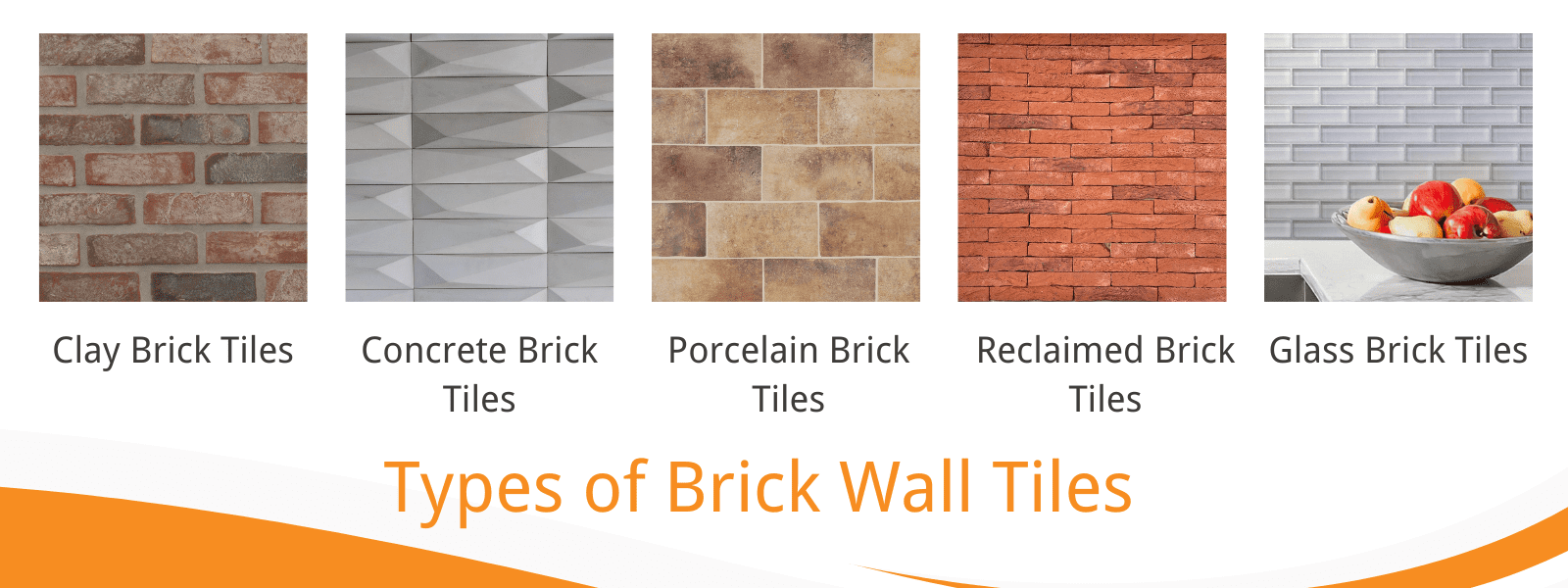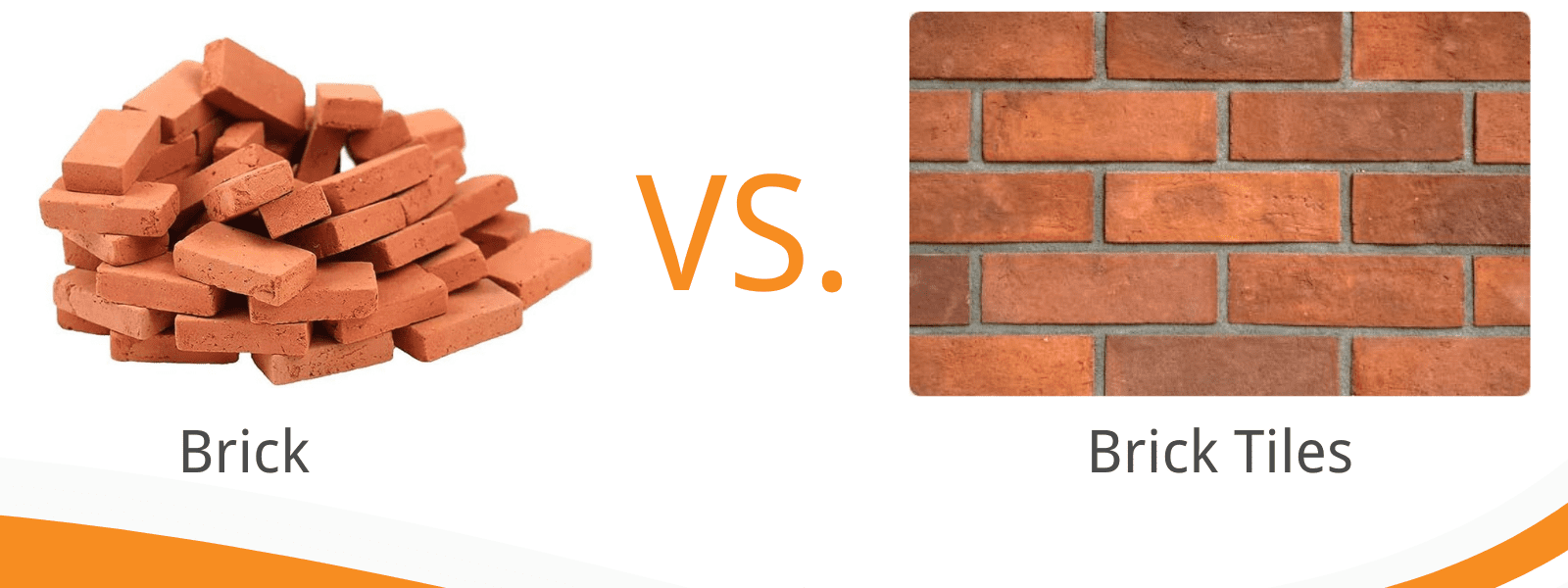Have you ever admired the rustic elegance of brick walls in historic buildings and cozy cafes? Brick wall tiles offer a way to recreate this classic aesthetic in any space, marrying the old-world charm with contemporary design and technology.
Transform your kitchen backsplash, bathroom, or living room wall into a sophisticated focal point that seamlessly combines aesthetic appeal with functional benefits, all while sidestepping the complexities and high costs associated with traditional full-sized bricks.
Keep reading to discover how brick wall tiles can revitalize your home or business space, making your design dreams a reality with simplicity and style.

What are Brick Wall Tiles
Brick wall tiles are thin slices of brick, or brick-like materials, designed to mimic the appearance of traditional brick masonry. They offer a practical and aesthetic solution for those seeking the rustic charm and durability of bricks with easier installation and maintenance. These tiles are commonly used to enhance the visual appeal of walls both indoors and outdoors, appearing in settings ranging from kitchens and bathrooms to façades and fireplaces.
Types of Brick Wall Tiles
Brick wall tiles can be categorized into several types based on their material composition, manufacturing process, finish, and intended application:
- Clay Brick Tiles: Made from natural clay that is fired in a kiln, these tiles offer a traditional look and come in various natural shades of red, brown, and orange.
- Concrete Brick Tiles: These are made from concrete and offer a more uniform appearance and size. They are typically less expensive than clay brick tiles and available in a wider range of colors.
- Porcelain Brick Tiles: High-density, highly durable tiles designed to mimic brick. These are suitable for high-moisture areas like bathrooms due to their low porosity.
- Reclaimed Brick Tiles: Made from salvaged bricks from old buildings, these tiles provide an authentic aged look and are an eco-friendly option.
- Glass Brick Tiles: A modern twist on the traditional brick, these are made from glass and can be used to create striking visual effects with their translucency.
Each type of tile offers unique benefits and aesthetic qualities, which can be chosen based on the specific needs and preferences of the project at hand.
What is the Difference between Brick and Brick Tiles?
The choice between brick and brick tiles significantly influences both the aesthetic outcome and the structural aspects of a project. Here’s a detailed breakdown of their differences:

Material Composition and Manufacture
- Brick: Traditional bricks are manufactured from natural clay and shale, which are molded and then fired at high temperatures in a kiln. This process imparts strength and weather resistance to the bricks, making them suitable for structural purposes in building construction.
- Brick Tiles: Brick tiles, on the other hand, can be made from similar materials as traditional bricks but are also available in other compositions like porcelain and concrete. They are formed into thin, flat sections that are designed primarily for surface finishing rather than structural support.
Physical Characteristics
- Size and Weight: Traditional bricks are thicker and heavier, typically measuring about 2.25 to 3.75 inches in thickness. Brick tiles are slimmer, often ranging from 0.5 to 1 inch thick, which reduces their weight significantly.
- Installation Process: The heavier and bulkier nature of traditional bricks requires more substantial installation efforts, including extensive mortar work and structural support. Brick tiles are lighter and easier to install, often using adhesives similar to those used for ceramic tiles, which simplifies the labor and equipment needed.
Cost Implications
- Initial Costs: Brick tiles generally cost less per unit than traditional bricks due to reduced material usage and easier manufacturing processes. However, the type of material (e.g., porcelain vs. clay) and the quality of the tiles can influence their price.
- Installation and Labor Costs: The installation of traditional bricks is labor-intensive, requiring skilled masons; this can significantly increase the overall cost of a brick wall. In contrast, brick tiles can often be installed by general contractors or even as a DIY project, which can reduce labor costs.
Aesthetic and Functional Use
- Aesthetic Versatility: Brick tiles offer greater versatility in appearance, with various colors, textures, and finishes that mimic everything from traditional brick to more modern designs. This makes them suitable for interior applications, including backsplashes, feature walls, and fireplace surrounds.
- Structural Versatility: While traditional bricks are used for their structural properties and load-bearing capabilities, brick tiles are used solely for aesthetic purposes and cannot bear structural loads.
Durability and Maintenance
- Weather Resistance: Traditional bricks are better suited for external use as they can withstand harsh weather conditions without significant degradation. Brick tiles, while durable, are better suited for interior uses or moderate external conditions, depending on their material.
- Maintenance Needs: Brick walls may require more maintenance such as repointing the mortar, cleaning, and sealing to maintain their structural integrity and appearance. Brick tiles are generally easier to maintain and require regular cleaning and occasional sealing, depending on their location and exposure.
Are Brick Tiles Cheaper than Bricks?
When considering wall treatments, cost is often a decisive factor. Generally, brick wall tiles can be more cost-effective than traditional full-sized bricks. This cost difference is due to several factors:
- Material Usage: Brick tiles are thinner and use less material than full bricks, making them less expensive to manufacture.
- Installation Costs: Brick tiles are lighter and easier to install, requiring less labor and time, which can significantly reduce installation costs.
- Transportation: Due to their lighter weight and smaller size, more brick tiles than full bricks can be transported in a single trip, lowering shipping costs.
These factors make brick wall tiles an appealing alternative for those who desire the aesthetic of brick but are constrained by budget or structural limitations.
Why are Brick Walls so Expensive?
The expense of brick walls can be attributed to several key aspects:
- Materials: Full bricks are made from natural clay, which involves a resource-intensive extraction and manufacturing process.
- Labor Intensity: Laying full bricks is a time-consuming and skill-intensive job that requires professional masonry, contributing to higher labor costs.
- Durability and Maintenance: Although bricks are a durable material, maintaining a brick wall, especially in harsh climates, can be costly due to the need for periodic repairs and treatments.
Choosing the Right Brick Wall Tiles for Your Project
Brick wall tiles offer a versatile, cost-effective alternative to traditional brick, making them an excellent choice for both interior and exterior applications. As you consider brick wall tiles, keep the following points in mind:
- Assess Your Needs: Consider the specific requirements of your project. Do you need tiles that can withstand high moisture, or are you looking for a purely decorative element?
- Budget Considerations: Remember that while brick tiles can be more budget-friendly than traditional bricks, the type and quality of tile can affect the overall cost.
- Installation: Evaluate whether you will need professional installation or if it is a project you can handle yourself, which could save on labor costs.
Before making your final decision, it's advisable to sample multiple tile options to see how they look within your space and how they meet your project's demands. Furthermore, consult with a professional to ensure that the tiles you choose are suitable for your specific application and environment.
Finally, whether you're renovating a historic property or adding a rustic touch to a modern home, brick wall tiles can provide the durability and style you seek. Make your purchase with confidence, knowing you've considered all necessary factors to find the perfect match for your design aspirations and practical needs.
FAQ about Brick Wall Tiles
Can you put tiles on a brick wall?
Yes, tiles can be installed over a brick wall by creating a smooth surface suitable for tiling. The three main methods are:
- Cement Sheet Overlay: Apply a cement backer board over the bricks to provide a flat, durable tiling surface.
- Stud Wall with Plasterboard: Construct a lightweight stud wall in front of the brick and finish with plasterboard.
- Smooth Render Application: Apply a layer of smooth render directly to the brick to even out the surface.
Each method ensures that the tiles will adhere properly and look professionally finished.
What are the cons of brick floors?
Brick floors, while durable and visually appealing, have some drawbacks:
- Hard Surface: The solid nature of brick can be uncomfortable underfoot, particularly without shoes.
- Porous Material: Unsealed brick is highly absorbent, making it susceptible to stains, mold, and mildew. Regular sealing is necessary to maintain its appearance and durability.
These factors should be considered when choosing flooring materials for areas where comfort and low maintenance are priorities.
Is brick tile hard to clean?
Cleaning brick tile flooring is straightforward but requires regular maintenance. Here's a simple routine:
- Sweeping: Use a broom or carpet sweeper to remove loose debris effectively.
- Deep Cleaning: For built-up dirt, especially in grout lines, use a mixture of water and mild detergent with a brush to scrub the surface gently. Rinsing thoroughly with clean water will prevent residue build-up.
While brick tiles are relatively easy to maintain, keeping the grout clean is crucial to preserve their overall look.
